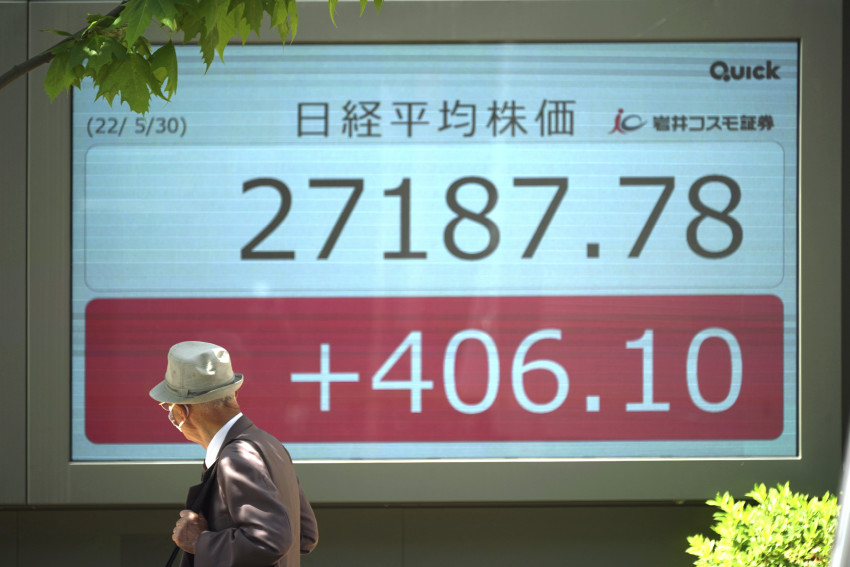Asian stocks rise after Wall St breaks string of declines

Asian stocks rose Monday after Wall Street rebounded from a seven-week string of declines and China eased anti-virus curbs on business activity in Shanghai and Beijing. Shanghai, Tokyo, Hong Kong and Sydney advanced. Oil stayed above $110 per barrel.
On Wall Street, the benchmark S&P 500 index finished Friday up 6.6% for its biggest weekly gain in 18 months after surging inflation declined in April. U.S. markets will be closed Monday for a holiday. “Markets rallied into the long weekend, providing a positive tone at the start of this week,” ING economists said in a report.
The Shanghai Composite Index advanced 0.5% to 3,145.77 after more factories and shops in Beijing and Shanghai were allowed to reopen. Shanghai, China's commercial capital, announced tax breaks and subsidies to help businesses recover from a two-month shutdown. The Nikkei 225 in Tokyo rose 587.75 points, or 2.19 percent, to close at 27,369.43, and the Hang Seng in Hong Kong gained 1.9% to 21,093.21. The Kospi in South Korea advanced 1.2% to 2,668.31.
Sydney's S&P-ASX 200 was 1.4% higher at 7,2890.10. India's Sensex opened up 2.1% at 56,025.84. New Zealand and Singapore gained while Indonesia retreated. On Wall Street, the S&P 500 rose 2.5% on Friday to 4,158.24, propelled by gains for tech companies.
Investors were relieved after Commerce Department data showed U.S. inflation, which has prompted the Federal Reserve to raise interest rates, decelerated to 6.3% over a year earlier in April, its first decline in 17 months. Markets are worried about whether the Fed can control inflation that is running at a four-decade high without tipping the biggest global economy into recession.
The Dow Jones Industrial Average rose 1.8% to 33,212.96. The Nasdaq, dominated by tech stocks, gained 3.3% to 12,131.13. The U.S. market has been in a slump for the past two months over fears about interest rate hikes that might slow economic activity, and the impact of Russia's war on Ukraine and a Chinese economic slowdown.
Crude oil prices are up nearly 60% this year due to fears about disruptions in supplies from Russia, the second-biggest global exporter. Wheat prices are up about 50% and corn prices are up 30%. Disruptions in manufacturing and trade due to China's shutdown of Shanghai and other industrial cities to fight virus outbreaks also have added to inflation pressures.
More factories, shops and other businesses are allowed to reopen this week in Shanghai and in the Chinese capital, Beijing, after authorities declared outbreaks under control. The Shanghai city government promised rent and tax cuts, faster approvals for construction projects and more subsidies for electric car purchases. In energy markets, benchmark U.S. crude rose 88 cents to $115.95 per barrel in electronic trading on the New York Mercantile Exchange. Brent crude, the price basis for international oils, advanced 79 cents to $116.35 per barrel in London. The dollar edged down to 127.03 yen from Friday's 127.10 yen. The euro rose to $1.0755 from $1.0733.
On Wall Street, the benchmark S&P 500 index finished Friday up 6.6% for its biggest weekly gain in 18 months after surging inflation declined in April. U.S. markets will be closed Monday for a holiday. “Markets rallied into the long weekend, providing a positive tone at the start of this week,” ING economists said in a report.
The Shanghai Composite Index advanced 0.5% to 3,145.77 after more factories and shops in Beijing and Shanghai were allowed to reopen. Shanghai, China's commercial capital, announced tax breaks and subsidies to help businesses recover from a two-month shutdown. The Nikkei 225 in Tokyo rose 587.75 points, or 2.19 percent, to close at 27,369.43, and the Hang Seng in Hong Kong gained 1.9% to 21,093.21. The Kospi in South Korea advanced 1.2% to 2,668.31.
Sydney's S&P-ASX 200 was 1.4% higher at 7,2890.10. India's Sensex opened up 2.1% at 56,025.84. New Zealand and Singapore gained while Indonesia retreated. On Wall Street, the S&P 500 rose 2.5% on Friday to 4,158.24, propelled by gains for tech companies.
Investors were relieved after Commerce Department data showed U.S. inflation, which has prompted the Federal Reserve to raise interest rates, decelerated to 6.3% over a year earlier in April, its first decline in 17 months. Markets are worried about whether the Fed can control inflation that is running at a four-decade high without tipping the biggest global economy into recession.
The Dow Jones Industrial Average rose 1.8% to 33,212.96. The Nasdaq, dominated by tech stocks, gained 3.3% to 12,131.13. The U.S. market has been in a slump for the past two months over fears about interest rate hikes that might slow economic activity, and the impact of Russia's war on Ukraine and a Chinese economic slowdown.
Crude oil prices are up nearly 60% this year due to fears about disruptions in supplies from Russia, the second-biggest global exporter. Wheat prices are up about 50% and corn prices are up 30%. Disruptions in manufacturing and trade due to China's shutdown of Shanghai and other industrial cities to fight virus outbreaks also have added to inflation pressures.
More factories, shops and other businesses are allowed to reopen this week in Shanghai and in the Chinese capital, Beijing, after authorities declared outbreaks under control. The Shanghai city government promised rent and tax cuts, faster approvals for construction projects and more subsidies for electric car purchases. In energy markets, benchmark U.S. crude rose 88 cents to $115.95 per barrel in electronic trading on the New York Mercantile Exchange. Brent crude, the price basis for international oils, advanced 79 cents to $116.35 per barrel in London. The dollar edged down to 127.03 yen from Friday's 127.10 yen. The euro rose to $1.0755 from $1.0733.
Source: japantoday.com
